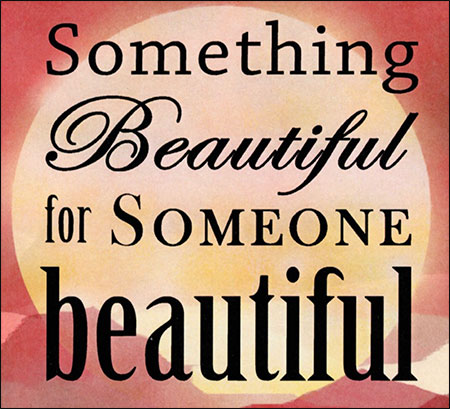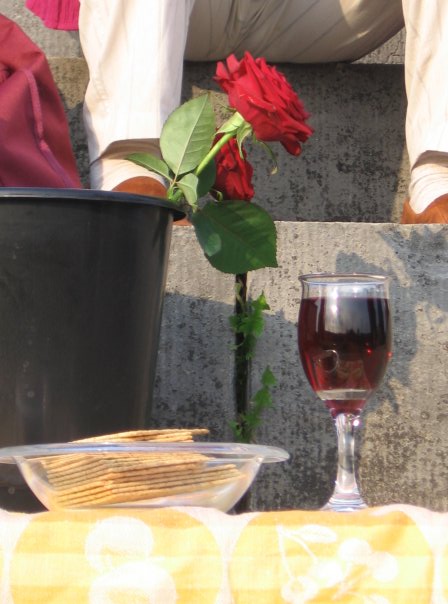
Warsaw 2012
The following report was filed by Sally upon the ATOR team’s return from Germany.
This is the tale of that amazing journey.
“Hineni! Here am I! Send Me!
Weak and imperfect, broken and so un-whole, use me, use us, O Lord, for Your great and good purpose. Who am I that You are mindful of me, and yet You are so much more than merely mindful… You love me. So deep and so wide, so great is Your love which sustains and strengthens me. Shepherd me, Lord! Lead me in the way You want me to go! And help me, Abba, to stay focused on that intimate communion with You, O Lord!”
Journal Entry, SKO
June 4, 2012
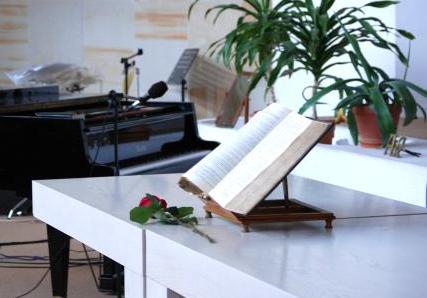
It is very hard to put into words and limited space all that happened during our time in Poland this year. It was a lot about our smallness and weakness—and God’s greatness. Early on, before the actual tour, the Lord impressed on me Psalm 23, and I realized how desperately I needed Him to lead me:
“The Lord is my shepherd, I shall not be in want.”
God enabled me to understand if I followed Him as He led us through these days in Poland, we would lack no good thing. If we took time to rest and be restored in the evenings and draw near to Him in the mornings, He would most certainly guide us in “paths of righteousness for His Name’s sake.” But it was contingent upon our time in His presence—being refreshed by His Spirit.
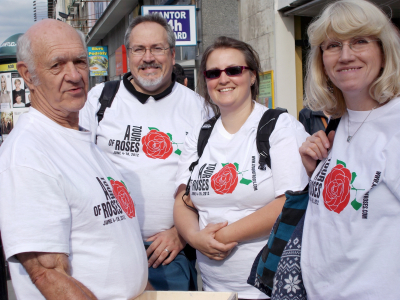
2012 ATOR team minus one
(L-R: Gale Lenz, Sam Walker, Heather Walker, Brygida Rusek)
There were five of us on the core team: Sam and Heather Walker from Paradise, CA, Gale Lenz from Riverside, CA, Brygida Rusek, originally from Wroclaw, Poland, and myself. And we certainly lacked for no good thing—food and fellowship, communication with our families, as was needed. One of the more difficult things Sam and Heather had to work through was their youngest daughter, Talia, breaking her arm while they were gone. It’s never easy to be away from family when unexpected events occur, yet each of us had not only the physical, but the emotional strength we needed daily for everything going on. Each of us also contended with pain in our bodies at some point during the two weeks. But all of us, if we weren’t healed quickly, found that sufficiency of grace in God.
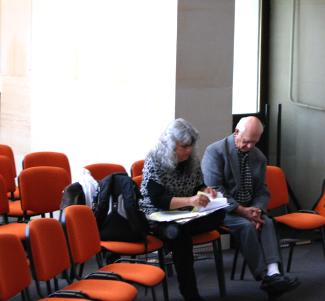
Precious moments of rest & fellowship
For the time we were together we formed a small community. Praying for each other played a vital role in our mornings with God. There was a point when my Polish friend Magda, who helped me plan our time in Warsaw, was overwhelmed with the stress of all the details involved. I stepped away from cleaning roses to be there for her. Gale endeared himself to both Magda and Bibi, by genuinely caring for them in a fatherly fashion.
Jews for Jesus was also in Warsaw at the same time we were there, conducting a special outreach during the Euro Games. Several times Sam led us in prayer for the Jews for Jesus team as they were on their way out to distribute tracts along with flyers for our concerts. Several people with the Jews for Jesus team also helped, when they could, prepare the 4000 roses we handed out in Warsaw.
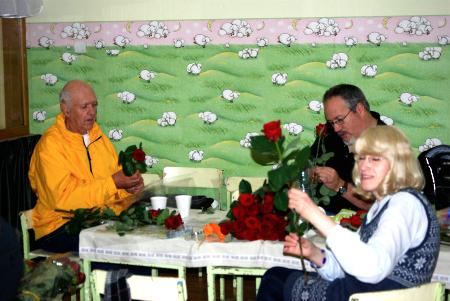
Gale, Sam, Brygida in painstaking rose prep
We also had many opportunities for fellowship around the dinner table in the facility where they were staying. There were at least seventy intercessors surrounding and inundating us with prayer, a sweet incense before God, so that the supernatural seemed almost natural. God held back weather, we saw healing in our midst, and people received the Lord into their hearts and lives. And I believe there is always that great cloud of witnesses, who, along with Jesus, are praying for us as we move forward in the Kingdom.
God was faithful to lead us to people who were disabled, lonely, discarded, homeless and poor. He brought us beside Jews and Gentiles, Poles and German, and people from many other nations. But one of the more profound examples of being led in paths of righteousness happened in Jedwabne.
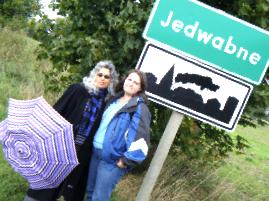
On the road to Jedwabne 2010
Jedwabne is a community with a very difficult history. During the Second World War all but seven Jews were rounded up and burned alive inside a large wooden barn. Most of the people from the town told us repeatedly that the Germans perpetrated this horror, but a book by Jan Gross, published in 2000, recorded eye-witness testimony that Poles were the perpetrators. It created a lot of controversy, bad press for Jedwabne, and a lot of angry feelings in the community as the media continued to push for answers to what really happened.
I remember reading Gross’ book in 2008. I found it in a bookstore in the Jewish section of Krakow during an earlier ministry trip. Walking into various shops selling Jewish books and other items, I would ask the clerks if they were Jewish. It seemed only natural to me that people selling literature and other items pertaining to the Jewish people would also be Jewish, or at the very least, working for owners who were. But that was not the case in Krakow. Strangely enough, when I asked the clerks they often gave me an odd look and quickly set the record straight. I then responded by saying I was Jewish and really appreciated their store.
But the shop where I encountered Jan Gross’ account was run by a young woman who answered my initial question by saying, “I love the Jewish people.” She went on to tell me that she was writing her thesis paper on a very difficult subject: Polish anti-semitism after World War II. Until then I had never heard about the Jewish people leaving Poland en masse because of anti-Jewish pogroms, during and after the war. That was when she pointed me to a very slim volume written by Jan Gross, simply titled Neighbors.
The next year I led my first team of A Tour of Roses to Germany and Poland. Magda Balcerak was part of that team and we became very good friends. It was Magda who asked me, sometime after we all returned home, if I might consider bringing A Tour of Roses to Jedwabne. She had met a young woman from the town, and in the course of their conversation Magda brought up her feelings about Jewish people. The woman shook with fear, could hardly continue talking with Magda at that point. It left such a deep impression on my friend that she decided to ask me what I thought of the idea. After much soul-searching and counsel—and a ton of prayer—we handed out roses in 2010 in the little village of Jedwabne.
To my great surprise, people were mostly very receptive. We were kissed and embraced by some, questioned by others—rebuffed by one or two—but the overall response was very warm. Several people prayed with Leonid, who was on loan from Jews for Jesus, to receive the Lord. And everyone who received a rose from us took time to read the attached card:
A Rose of Remembrance
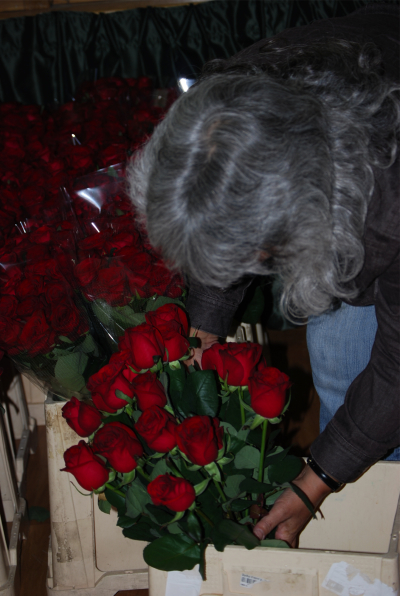
Sally pulls roses from one of the many the buckets
As we handed out roses it almost seemed like the trees, the shops, and the people, which had earlier appeared gray, dreary, and suspicious, were slowly infused with fresh color; somehow warmed, as if in the sun, and became more welcoming. Children perched on benches in the square with lovely red roses in their hands and the shopkeepers all around were holding roses, and many were smiling. I wondered to myself, as I have often since beginning A Tour of Roses, can an entire town be changed by such a simple act of kindness…? Or is it only a fleeting glimpse of God’s Kingdom come?
This year we considered Jedwabne in prayer and found the Lord releasing us to go again. I briefly shared in many of my U.S. concerts about Jedwabne’s history, as I understood it. I encouraged my brothers and sisters to reach out to this town with mercy and love, by writing prayers of blessing for the people. We collected some amazing prayers from believers all over the country, many of them Jewish. Below is one of my favorites:
“The voice of the man I love! Here he comes, bounding over the mountains, skipping over the hills! My darling is like a gazelle or young stag. There he is, standing outside our wall, looking in through the windows, peering in through the lattice. My darling speaks; he is saying to me, “Get up, my love! My beauty! Come away! For you see that the winter has passed, the rain is finished and gone, the flowers are appearing in the countryside, the time has come for (the birds) to sing, and the cooing of doves can be heard in the land. The fig trees are forming their unripe figs, and the grapevines in bloom give out their perfume. Get up, my love, my beauty! Come away!”
Song of Songs 2:8-13
As we come out of the winter Lord and into the spring we are reminded of how you can bring life from what was once dead. How a tree loses all its leaves in the fall and looks dead all winter. In the winter nothing grows there are no flowers and there is no beauty. But as the seasons change and the cold days disappear and the warmth of the sun returns we see how life once again blossoms.
I ask Yeshua my King that the time of winter be over for these people. I ask that you bring the rain of new life washing away the old life and once again bring your healing water. As the flowers come up from seeds that were planted long ago I ask you Yeshua to water the seeds of healing to these people of Jedwabne. Let the seeds of life in you grow strong and deep. Let the words of truth be known in each and every household in this land. Light the way of your word over each father. As we need the sun to bring the light for the plants to grow. Let the light of the true SON shine on father, mother, sons and daughters that they may know of your love and forgiveness.
In the service of Messiah,
Messianic Rabbi Andrew Dinnerman
New Jersey
Red for the blood for the blood of the people who died
Red for the Savior’s blood which was shed for your people and mine
Red for His love, which makes love between us possible
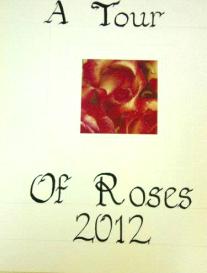
Cover of the homemade scrapbook presented to priest
Many of these blessings were translated into Polish and Heather Walker put them together in a beautiful scrapbook, which we presented to the senior priest of the Catholic church in Jedwabne. We also had a few of them printed up on little cards to hand out to various people in the community, which led to some interesting encounters…
“I went to Jedwabne with these prayers of blessing in hand, beautifully put together by Heather. We walked through the town—praying—and I saw this man looking at us from across the street. His was the only family (that we know of) to shelter a little Jewish girl. Even her sister was killed. The man started telling his story as soon as we gave him a prayer card. And he said it was the Germans who forced them at gunpoint to do the terrible things they did. The man needed to tell his story. But at a certain point we stopped him. I began to realize at that moment, it wasn’t for us to know who did it. In a sense, that didn’t matter so much anymore. What mattered was the loss that happened and the grieving that needs to come, so that healing may follow. There may very well be those who need to acknowledge/confess their sins. And maybe all need to deal with their feelings of fear or indifference to what happened–their hardness of heart, but only God can bring them that revelation, and it doesn’t come with a voice of condemnation–but the invitation that Love brings, to be free of our sin through repentance…”
Journal Entry, SKO
June 19, 2012
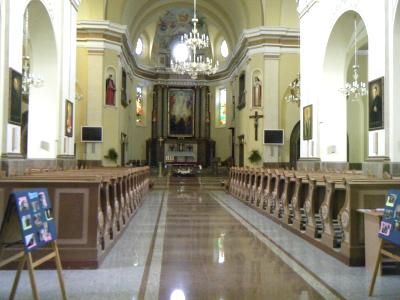
The Catholic church in Jedwabne
We attended the Mass on Sunday in Jedwabne. It was packed. We stood. Bibi was kind enough to translate many parts of the service for me. There was one portion where everyone was on their knees for about 20 minutes. The floor was marble—cold and hard. But it was there—on my knees praying–that the Lord spoke to my heart a word for the people gathered there:
“I am here in this place reaching for these people, but they don’t see Me. They only see the priest, but I am beyond him, reaching for My children, and reaching for him also. I see him as a Father sees a son. Healing will come to this city, and to the priests. I will open the hearts of this people and rain down upon them My mercies, which are new every morning, for surely I am here in this place among them.”
We had tea with the priest and his associates after mass. It was my second time visitng the priest, and he seemed so much warmer and more open. Several times he shared how he believed that one day there would be one flock and one shepherd, and that the Messianic Jews were a sign. He told us how one of the younger priests had attended an Alpha course. Originating in the UK, Alpha, an engaging evangelical program for people who have questions about God, has spread all over the world. The priest went on to say they are hoping to begin a series of small home groups in the town. I was very surprised.
He also spoke to us about how the Poles in the town were not responsible for the horrible things Jan Gross wrote about in his book. And he emphasized there were many inaccuracies in the book, but he also added there were some things that were true. I understood his position better than I had in 2010, he needed to advocate for the people in his parish, and I didn’t argue with him. I suggested that none of us were there the night of the pogrom and none of us saw with our own eyes what happened—including Jan Gross.
Even more importantly, none of us could know what was in the hearts of all those in the town, who in some way witnessed what happened that night. Only God could know. But we both agreed the people of Jedwabne are in need of deep healing. And I offered again to do a concert, explaining some of my reasons for wanting to do this. He was more open to the idea this time, but suggested that it should be more of a spontaneous event in nature. And when Sam suggested I ask him to say a prayer of blessing for us when we gather for the concert, he was agreeable. And that also, was encouraging.
As I thought about healing for Jedwabne I kept returning to the Kaddish. The Kaddish is a Hebrew prayer said in remembrance of those who died, but it isn’t a prayer for the dead as much as it is a prayer about life, blessing, and peace. And I wondered if the people of the town needed to say Kaddish. The idea kept cycling around in my brain until I finally said something to the priest, knowing full well how impossible it might sound. When I suggested it he couldn’t imagine how it might happen—and neither could I, truthfully…
After we said our goodbyes, we drove over to the Jewish memorial at the edge of town. It is surrounded by farming, at the end of a road, across from the Jewish cemetery. It is a stark remembrance—a huge stone with a slab of charred wood from the burned barn in the center. It is hard to look at, and the area was uncared for, left to wind and weeds.
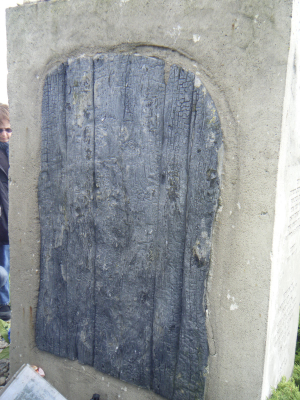
A fragment of the barn: all that is left to
memorialize the pogrom at Jedwabne
“Even though I walk through the valley of the shadow of death, I will fear no evil for You are with me… You prepare a table before me in the presence of my enemies. You anoint my head with oil; my cup overflows…”
Sam took out his guitar and I began to worship on my keyboard as the others wandered around and prayed. There, in the graveyard, ignored, but not forgotten, where hatred and violence ended the lives of so many, song and prayer went up, and the oil of the Lord came down. At one point I glanced up the road and saw a lone figure walking toward us. Instantly my heart leaped within me and I felt sure this must be a “seed.” It was Marek.
We had prayed for him in the town square the day before. His father had been an alcoholic and regularly beat him when he was a child. Probably nearing his fifties now, his father had long ago passed away. But Marek’s posture and speaking still bore witness to his painful upbringing. Marek said Kaddish with us in that fogotten place of remembrance, and I knew the Lord had blessed us with a token—a promise…
Psalm 23 ends with a declaration:
“Surely goodness and love will follow me all the days of my life, and I will dwell in the house of the Lord forever.”
While we were in Poland we soaked the earth and air with prayers and songs—in Warsaw, Sobibor—and Jedwabne. We handed out roses to many , spoke God’s mercy to several, and embraced some who were seldom touched with kindness. And the idea grew in me that wherever we walked the Lord’s goodness and love followed in our wake, continuing to water and nurture the seeds planted through us.
Such is the mercy of our God! He would reach for those many others would spit upon and condemn. He would reach for the whole town—and does—but not all will receive that great love that will set them free.
Let it be, Lord, that our narrow, faint and fickle hearts hinder not Your great and tender mercies toward those still struggling with their sin and fear in the shadow of shame. Only You, Almighty Lord and God, can set them free, can help them see Your fierce and tender love for each one!
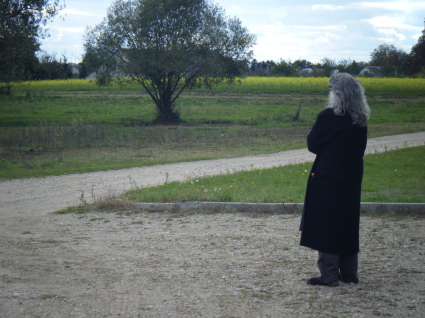
©Copyright 2012 Improbable People Ministries
“So from now on we regard no one from a wordly point of view. Though we once regarded Christ in this way, we do so no longer… All of this is from God, who reconciled us to himself through Christ and gave us the ministry of reconciliation: that God was reconciling the world to himself in Christ, not counting men’s sins against them. And he has committed to us the message of reconciliation.” (2 Corinthians 5:16, 18-19)

